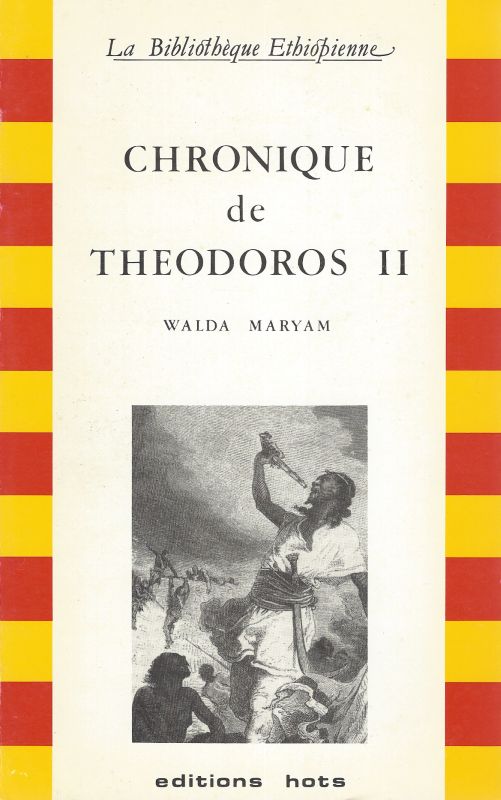Maryam, Chronique de Théodoros II: Roi des rois d'Éthiopie (1853-1868).
Chronique de Théodoros II: Roi des rois d’Éthiopie (1853-1868). D’Après un Manuscrit Original de Walda Maryam. Traduction de C. Mondon-Vidailhet.
Clamecy, Éditions Hot, 1982. 8°. 98 pages. Broché / Softcover. Très bon état.
Téwodros II (baptized as Sahle Dingil, and often referred to in English by the equivalent Theodore II) (c. 1818 – April 13, 1868) was the Emperor of Ethiopia from 1855 until his death.
He was born Kassa Haile Giorgis, but was more regularly referred to as Kassa Hailu. His rule is often placed as the beginning of modern Ethiopia, ending the decentralized Zemene Mesafint (Era of the Princes).
Tewodros II’s origins were in the Era of the Princes, but his ambitions were not those of the regional nobility. He sought to reestablish a cohesive Ethiopian state and to reform its administration and church. He did not initially claim Solomonic lineage but did seek to restore Solomonic hegemony, and he considered himself the Elect of God. Later in his reign, suspecting that foreigners considered him an upstart and seeking to legitimize his reign, he added “son of David and Solomon” to his title.
Tewodros II’s first task was to bring Shewa under his control. During the Era of the Princes, Shewa was, even more than most provinces, an independent entity, its ruler even styling himself Negus. In the course of subduing the Shewans, Tewodros imprisoned a Shewan prince, Menelik II, who would later become emperor himself. Despite his success against Shewa, Tewodros faced constant rebellions in other provinces.
In the first six years of his reign, the new ruler managed to put down these rebellions, and the empire was relatively peaceful from about 1861 to 1863, but the energy, wealth, and manpower necessary to deal with regional opposition limited the scope of Tewodros’s other activities. By 1865 other rebels had emerged, including Menelik II, who had escaped from prison and returned to Shewa, where he declared himself Negus. In addition to his conflicts with rebels and rivals, Tewodros encountered difficulties with the European powers. Seeking aid from the British government (he proposed a joint expedition to conquer Jerusalem), he became unhappy with the behavior of those Britons whom he had counted on to advance his request, and he took them hostage and chained them. In 1868, as a British expeditionary force sent from India to secure release of the hostages stormed his stronghold, Tewodros committed suicide.
Tewodros II never realized his dream of restoring a strong monarchy, although he took some important initial steps. He sought to establish the principle that governors and judges must be salaried appointees. He also established a professional standing army, rather than depending on local lords to provide soldiers for his expeditions. He introduced the collection of books in the form of a library, tax codes, as well as a centralized political system with respective administrative districts. He also intended to reform the church, believing the clergy to be ignorant and immoral, but he was confronted by strong opposition when he tried to impose a tax on church lands to help finance government activities. His confiscation of these lands gained him enemies in the church and little support elsewhere. Essentially, Tewodros was a talented military campaigner. (Wikipedia)
- Keywords: Abyssinia · Africa · African Cultures · African history · Ethiopia · History · The Ethiopian Empire · Theodoros II of Africa
- Language: Français
- ISBN: 0576171018
- Inventory Number: 25884AB
EUR 68,--
© 2025 Inanna Rare Books Ltd. | Powered by HESCOM-Software










